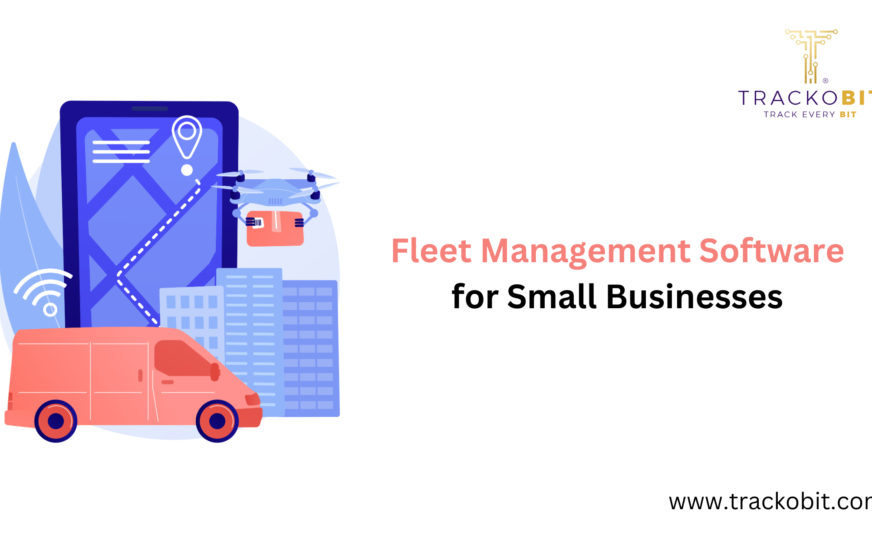Well, are you a small business, and managing your fleet makes you feel like heading cats? We know it is a lot to deal with, you are just constantly juggling to keep a close eye on your fleet’s movements! That’s not all you are also lacking efficiency and having a hard time keeping costs down while balancing your client/customer satisfaction. Too much to look over, right?
What if we tell you that we have a solution that can eliminate a significant portion of your problems? Yes, you read it right- Fleet management software can not only help manage your fleet but also away all the operational challenges and help you focus on maximizing profits.
All of this sounds wonderful, right? So without any further ado let’s get started with everything revolving around fleet management software.
What is Fleet Management Software?
Fleet management software is a tool designed to help organizations manage and coordinate their vehicle fleets. This software typically offers a range of features to enhance the efficiency, safety, and cost-effectiveness of fleet operations.
Features of Fleet Management Software
- Vehicle Tracking- Fleet management software uses GPS technology to monitor the real-time location of vehicles, ensuring efficient routing and better oversight of fleet movement.
- Maintenance Management- Fleet monitoring solutions help fleet managers track vehicle maintenance schedules, log service history, and provide reminders for upcoming maintenance to keep the fleet in good working condition and prevent breakdowns.
- Fuel Management System- The fuel management system monitors fuel consumption, tracks fuel expenses, and helps identify all the inefficiencies or mitigate fuel theft.
- Driver Management- Managing drivers with fleet management software becomes easy as you keep records of driver information, track driver behavior (such as speeding, harsh braking, and idling), and also ensure compliance with driving regulations.
- Route Planning- An ideal vehicle management system helps you with analyzing routes to find the most efficient paths. This further helps in reducing time, fuel consumption and wear and tear on vehicles.
- Compliance and Reporting- These systems help ensure that the vehicles and drivers comply with industry regulations, such as hours of service (HOS) and electronic logging device (ELD) mandates. It also helps you with generating reports and various
Why is Fleet Management Important?
There are various reasons why fleet management matters but the main reason why managing a fleet efficiently matters is that it can improve a fleet’s overall operational efficiency.
Some of the most important reasons why fleet management is important are unfolded below-
1. Cost Efficiency
Effective fleet management solutions like TracoBit help reduce operating costs through better fuel management, maintenance scheduling, and route optimization. This leads to lower fuel consumption, fewer repairs, and reduced vehicle downtime.
2. Safety
Ensuring the safety of vehicles is well maintained also the drivers are trained accordingly to reduce accidents and enhance the safety of both the drivers and the public.
3. Regulatory Compliance
Fleet managers need to ensure that all vehicles comply with local, state, and federal regulations, including emissions standards, safety inspections, and driver hours of service. Non-compliance can lead to fines and legal issues.
4. Asset Utilization
Proper fleet management ensures that vehicles are used efficiently, avoiding unnecessary wear and tear, and extending their lifespan. This includes tracking vehicle usage, scheduling preventive maintenance, and managing vehicle replacements.
5. Productivity
By optimizing routes and schedules, fleet management can improve delivery times and service efficiency. This further leads to better customer satisfaction and increased productivity.
6. Data Management and Reporting
Advanced fleet management systems provide real-time data on vehicle location, performance, and driver behavior. This data helps in making more informed decisions, forecasting needs, and improving the overall fleet performance.
7. Risk management
Effective fleet management includes monitoring and mitigating risks related to vehicle operations, such as accidents, theft, and unauthorized use of the vehicle. Implementing safety protocols and tracking systems helps manage these risks.
The Role of Telematics in Fleet Management
The telematics technology is commonly integrated into fleets via vehicle on-board diagnostic (OBD) ports to provide data into the software platform. Having access to telemetry data can encourage safer, more eco-friendly driver behavior and influence compliance with fleet policies. In addition, telematics systems can –
Optimize Fleet Utilization By
- Analyzing Usage Patterns- Telematics data helps identify underutilized vehicles, allowing fleet managers to reallocate resources more efficiently and maximize the use of their assets.
Reduce Operational Costs Through
- Fuel Efficiency Monitoring- By tracking fuel consumption and identifying inefficiencies, telematics systems help fleet managers implement strategies to reduce fuel costs.
Enhance Driver Safety By
- Monitoring Driving Behavior- Telematics systems track driving habits, providing insights and feedback to encourage safer driving practices and reduce accidents.
Ensure Regulatory Compliance By
- Automating Record-Keeping- Telematics automates the recording of hours of service, vehicle inspections, and other regulatory requirements, ensuring compliance and reducing administrative burdens.
Streamline Maintenance Management Through
- Predictive Maintenance Alerts- Telematics provides real-time data on vehicle health, allowing for timely maintenance and preventing unexpected breakdowns.
Boost Productivity By
- Route Optimization- Telematics systems analyze traffic patterns and suggest the most efficient routes, reducing travel time and improving overall productivity.
Improve Security By
- Theft Prevention and Recovery- Telematics enables real-time tracking of vehicles, aiding in the quick recovery of stolen assets and enhancing overall fleet security.
Enhance Environmental Sustainability By
- Monitoring Emissions- Telematics systems track vehicle emissions, helping fleet managers implement eco-friendly practices and reduce the environmental impact of their operations.
Why You Should Consider Getting Your Hands on TrackoBit’s Fleet Management Software
TrackoBit’s fleet management software offers a multitude of benefits, such as improved driver behavior, comprehensive cost analysis, and real-time visibility into fleet location and performance. Beyond mere location tracking, this sophisticated software provides valuable insights into vehicle efficiency and performance, presenting data in a clear and accessible manner for organizations.
With the support of technology for proactive maintenance strategies, fleet managers can optimize their assets by establishing preventative maintenance schedules. Furthermore, many organizations can benefit from TrackoBit’s driver application, which facilitates rapid data transfer and accessibility. This feature allows for the prompt identification of issues that may have otherwise gone unnoticed or escalated into more significant problems.
Get a free demo today!
Feel free to submit more guest posts through Links Building Servcies - Best Prices. Buy Author Account / 1$ Guest Post Here






















